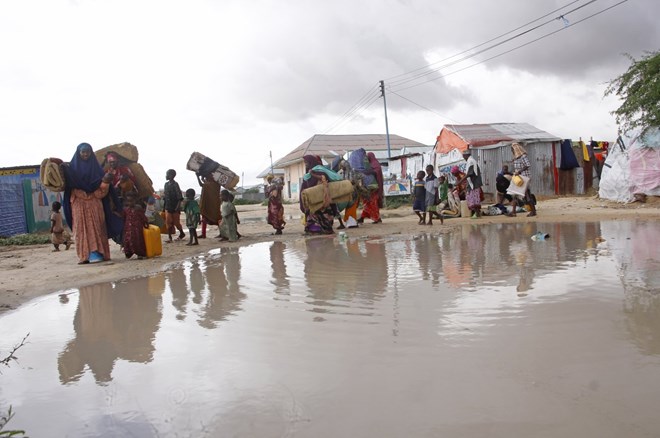
Thursday December 21, 2023

Displaced Somali vacate their camps after heavy floods entered their makeshift shelter in Mogadishu, Somalia, Nov.13, 2023. (AP Photo)
Türkiye sustains its aid to Somalia amid a catastrophe in the country. Somalia Wednesday received the second batch of humanitarian aid shipments from Türkiye, which will be distributed to those affected by the country's recent heavy floods caused by El Nino phenomena.
Somalia’s National Disaster Management Agency (SoDMA) received the humanitarian aid shipments sent by the Turkish Red Crescent.
The shipment was handed over to the head of the Red Crescent Somalia office in Mogadishu by Turkish Deputy Ambassador to Somalia Ismail Emre at a ceremony held in the capital Mogadishu.
The humanitarian food package will help Somalis affected by the country's recent flooding. "This aid is aimed to be distributed to the needy facing difficulties across the country,” said SoDMA Commissioner Mahamuud Moallim, who received the shipment, expressing gratitude to Türkiye for its support in the challenging time.
The aid is the second shipment from the Turkish Red Crescent to arrive in the Horn of Africa nation since flood relief began in mid-October of this year.
Extreme floods caused by El Nino phenomena have wreaked havoc in Somalia, displacing over 750,000 people and overall affecting over 2 million inhabitants of the country. The floods have also killed more than 100 people in the worst affected areas, including Baidoa, the administrative capital of Somalia’s south-western state, one of the flood’s epicenters. Last month, the Somali government declared the floods a "national state of emergency."
Over two million people across the Horn of Africa have been forced from their homes by torrential rains and floods, according to Agence France-Presse (AFP) tally compiled from government and U.N. figures.
Almost 300 people have also lost their lives in Somalia, Kenya and Ethiopia as the region grapples with its latest devastating climate disaster. The heavy rainfall, linked to the El Nino weather pattern, has struck just as the region is emerging from the worst drought in 40 years that drove millions into hunger.
"It's a dire situation," the charity Action Against Hunger said in a statement on the eve of the start of the COP28 climate summit in Dubai last month. "Regions that were struggling to recover from the economic and environmental impacts of prolonged drought are now doubly burdened with flooding," it said. The Horn of Africa is one of the regions most vulnerable to climate change, even though the continent's contribution to global carbon emissions is a fraction of the total.
Extreme weather events are occurring with increased frequency and intensity. The latest disaster has exacerbated a deep humanitarian crisis in Somalia, one of the poorest countries on the planet that has also been battling a bloody insurgency for the past decade and a half.
Flooding has cost the lives of more than 100 people, and displaced more than one million, according to a joint statement issued by the United Nations and Somali officials.
Authorities in Mogadishu declared a state of emergency earlier in November over what the United Nations has described as "once in a century" flooding, and have warned against the proliferation of disease. The deluge has engulfed homes and farmland and left many communities marooned, with roads and bridges damaged and hospitals and schools closed.
An estimated 1.5 million children under the age of five are facing acute malnutrition over the period between August this year and July 2024, the joint U.N.-Somali statement warned.
"Recurrent climate shocks, widespread insecurity and rampant poverty have pushed the people of Somalia to breaking point," U.N. envoy George Conway said. The statement said that floodwaters could swamp over 1.5 million hectares (3.7 million acres) of farmland in December. In a move that could help alleviate the situation for some, the Somalia government said it had received 25,000 tonnes of grain from Russia that would be distributed urgently to flood-affected people, with another 25,000 tonnes expected later in December.
While the country narrowly avoided famine thanks to humanitarian aid, the U.N.'s World Food Programme warned earlier this month that a quarter of its population, 4.3 million people, is forecast to face crisis-level hunger by the end of the year.
Somalia is enjoying a close economic, diplomatic and military friendship with Türkiye that has been growing since President Recep Tayyip Erdoğan visited Somalia in 2011. Since then, Türkiye has built an 80,000-square-meter (861,112-square-foot) embassy in Mogadishu, which is its biggest embassy in Africa.
Turkish humanitarian organizations are also operating in the country and helped avert a famine in 2022. Somalia has witnessed one of the worst droughts in four decades for the last two years. Last month, the Turkish embassy in Mogadishu hosted a signing ceremony for a joint venture agreement between a Turkish and Somali company to build a biogas power plant in Mogadishu.
The plant will have a production capacity of 5.6 MW/hour, providing energy to around 40,000 homes by the end of 2024, according to the embassy. Somalia also anticipates the opening of a Ziraat Bank branch in Mogadishu, which will be the first Turkish bank in the country.